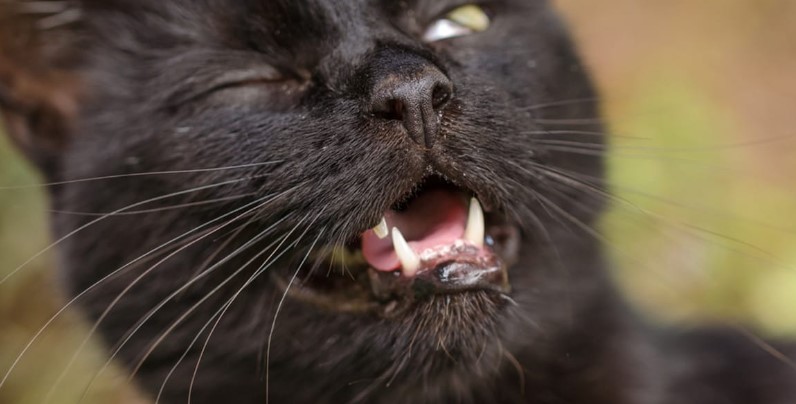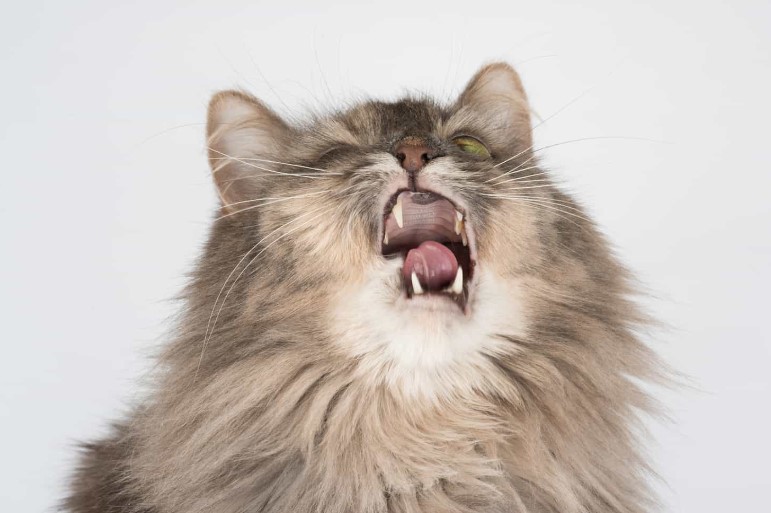Sneezing in cats is a common problem, but what causes it? There are many reasons your cat may sneeze, from allergies to infections to the Feline herpes virus. If your cat sneezes frequently, here are some solutions for the problem. Read on to learn more! Listed below are some possible causes of cat sneezing. Fortunately, there are many simple solutions to this problem.
The exact cause of sneezing in cats isn’t clear. Sneezing is that involuntary act of forcibly expelling air from the lungs and nasal passages by suddenly closing the glottis and breathing in, which thrusts air forward through the narrow opening between the vocal cords. [1] Sneezing is automatic, meaning it happens without any conscious thought or effort. The most common symptoms of sneezing are a sudden burst of air from the nose or mouth, followed by the typical sniffling sound.

why do cats sneeze
One of the most common questions cat owners have is, “Why do cats sneeze?” Sometimes the sneezing is a symptom of a more serious underlying health problem. Cats can develop allergies to dust, perfume, or other irritants in the air. Other times, cats sneeze because of a chronic upper respiratory problem. If your cat sneezes frequently, you may want to seek veterinary help as soon as possible.
A cat’s sneeze can be a sign of an underlying medical condition, like pneumonia. It is a natural reflex that clears the nasal passage of potentially harmful objects. During the process, the vocal cords close and pressure builds in the chest. A sudden opening of the vocal cords forces pressurized air up the respiratory tract, expelling the irritants and potentially infectious particles.
While cats’ sneezes are adorable, they are also important to identify as soon as possible. Cats can catch upper respiratory infections and colds, and a simple nose tickle may trigger a sneeze. So, before you panic, check out these common causes of a cat’s sneezing. This way, you can avoid the onset of symptoms in your cat and ensure a healthy life for your pet.
Causes of cat Sneezing
Many factors can cause a cat to sneeze. Some common causes are a tickle in the nose or mild chemicals, like pepper. Other causes include a sinus infection or fungal infection. Cats are highly contagious and infectious, but most URIs are preventable with vaccination. Vaccinations are required for both cats and humans, and should be performed at a young age and on schedule.
Your cat can be allergic to a number of things, including dust, pollen, and smoke. Certain chemicals and deodorising sprays may also cause your cat to sneeze. Other possible causes include foreign bodies in your cat’s mouth, such as grass seeds and litter. Cats that sneeze excessively may have a respiratory infection, as well. To learn more about cat allergies, check out this article.
The sneezing reflex is triggered by environmental irritants and diseases. While it may be cute when a cat sneezes, it may be more serious than you realize. The first step to treating a sneezing cat is to consult a veterinarian. A reputable medical center like Cherrelyn Animal Hospital is a great choice. The veterinarian will be able to determine which irritants are causing your cat to sneeze.
infections
Although the causes of cat sneezing infections are various, the most common and the most serious of these are viral and bacterial. The symptoms of viral infections may be temporary, but a bacterial infection can cause permanent damage to your cat’s nose and sinus cavities. This condition is called post-viral rhinitis and is less common and less understood than viral rhinitis.
There are several causes of sneezing in cats, with viral and bacterial infections being the most common. Fungi, like thrush, can infect cats, and they can spread these infections to their surroundings. Cats that sneeze frequently may have a bacterial infection – such as Bordetella bronchiseptica – and it’s important to get it treated quickly.
A veterinarian may suspect that a bacterial infection is the cause of your cat’s sneezing, and they may take a swab to confirm the diagnosis. Although fungal infections are difficult to treat, some respond well to antifungals. In some cases, polyps can grow into the nasal cavity and require surgical removal. Unfortunately, removing polyps can lead to regrowth, so you should always make an appointment with a veterinarian to ensure that you’ve found the source of your cat’s infection.
Feline herpes virus
Although a kitten can have herpes without showing symptoms, the cat can still spread the virus to other kittens, cats, and even other people. Herpesvirus can cause cat sneezing or discharge, and is often associated with secondary bacterial infections. As a result, the symptoms of feline herpes may last for several months or even years. A cat may shed the virus for months or even years before any symptoms appear. The virus can also be transmitted to kittens through direct contact or through sneeze droplets.
A symptomatic diagnosis of feline herpes virus infection is usually based on clinical signs and may include nasal discharge and anorexia. Cats with feline herpesvirus infection may also develop conjunctivitis, enlargement of lymph nodes, and corneal ulceration. Some cats may also develop upper respiratory infections. Because it is passed through respiratory secretions, feline herpes virus infection is a common cause of cat sneezing and eye discharge.
Feline calicivirus
The sneezing that you notice on your cat could be caused by feline calicivirus, a highly contagious virus. The virus most often affects kittens, but cats of all ages can get it. The virus is transmitted through contact with saliva, eye discharge, and other contaminated objects. In some cases, stress can trigger a relapse.
The virus is easily spread among cats, since it lives in respiratory secretions and eye discharge. Cats shed virus through sneezing, and particles in aerosol droplets can travel several meters. While there is no known way to prevent this virus from spreading from one cat to another, cats can infect other cats by sharing their food bowls or bedding. However, cats that recover from the infection can become carriers of the virus.
A veterinarian may make a presumptive diagnosis based on clinical signs and the history of the animal. If the cat does not respond to treatment, a definitive diagnosis is sometimes necessary. Blood tests, serum, and tissue samples may also be submitted to a lab for calicivirus testing. A diagnosis will be provided once the sneezing and coughing have subsided.
potential irritants or allergens
Many cats sneeze due to an irritant or allergy. These irritants may be particulate matter or vapor that enter the nose and cause inflammation. Cats with flat faces and short muzzles are at a higher risk for irritant-related sneezing. Inflammation may also be the cause. Bacterial infections, like bordetella and herpes virus, can also cause sneezing.
In some cases, cat sneezing is caused by inhaled irritants or allergens. The symptoms of cat allergies may include coughing, swollen paws, and vomiting. In addition to these allergies, many common household items can irritate your cat. These include smoke, pollen, and insecticides. In some cases, your cat may even develop an allergic reaction to a toy or other item.
Once you find the cause of a cat’s sneezing, you should take your cat to a veterinarian to get tested. A cat with respiratory issues may require a course of antibiotics, steroids, and a dehumidifier to help reduce the irritation. Your vet may recommend surgery or other measures to relieve the symptoms. Fortunately, many of these treatments are safe and effective.
Sneezing and Other Symptoms
Sneezing and other cat symptoms can be caused by a variety of different factors, including irritants, chemical fumes, or the simple tickle of a nose. In some cases, a cat’s sneeze is a reflex reaction to something it ingests, such as tobacco smoke or perfumes. A bacterial infection may also be the cause, especially when the sneezing is accompanied by other symptoms, such as a cough, excessive tearing, and discharge from the eyes.
Treatment for a sneezing and other cat symptoms will depend on the cause, but it will be based on the severity and frequency of the problem. Generally, a humidifier will be enough to alleviate the symptoms, but more severe cases will likely require antibiotics, antihistamines, steroids, and fluids. Surgery may be an option if the infection persists and does not respond to medical therapy.
Sneezing and other cat symptoms may be harmless in themselves, but if they occur regularly, you should take your cat to the veterinarian immediately. Your veterinarian can rule out any underlying problems that are causing the cat’s sneezing, including an allergy or an infection. You can discuss your cat’s health with the friendly staff at a vet’s office. They can also provide you with advice on further measures to take if the symptoms persist.

When to See the Vet
If your cat is consistently sneezing, it may be time to visit the vet. Although cats sneeze on occasion, persistent sneezing indicates an underlying health problem. Sneezing may be caused by a bacterial infection or upper respiratory infection. The veterinarian can help you determine which type of illness your cat is suffering from and treat it accordingly.
Symptoms of allergies vary by severity. Some causes of cat sneezing include a reaction to pollen, food allergies, or vaccines that protect the cat from respiratory infections. Most sneezing in cats is temporary and will go away on its own. Fortunately, you do not have to seek medical treatment if your cat sneezes only occasionally. If your cat does develop a pattern of frequent sneezing or if it appears more than three times a day, it is time to seek veterinary help.
Sneezing may be the result of several different conditions. A cat may sneeze in response to a tickle or a chemical irritant such as pepper. A sinus infection can be a result of a fungal infection or a viral respiratory infection. A cat may also sneeze in response to a cold, which may be accompanied by nasal congestion.
The reason cat sneezing is common is because cats like to keep themselves clean with rapid, short bursts of air when they are grooming themselves. The narrow nasal passages of a cat is what causes the sneezing. They will use their tongue and paw to push dirt and debris up one side of the passage, then that force will cause that passage to squirt out whatever it can, which if it is a hair, then that entire process starts over again. Sneezing in cats can be caused by parasites, bacteria, viruses or molds which can affect their breathing and cause inflammation inside of their nasal passages.
